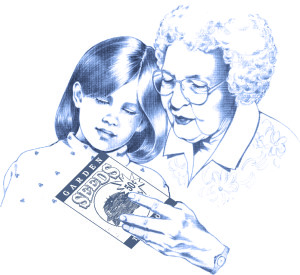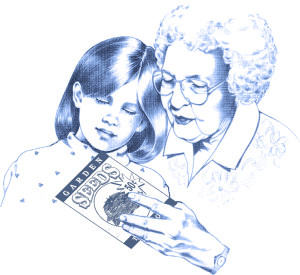 I remember as a child sitting with my grandmother sorting through vegetable and flower seeds each spring. She would start looking forward to planting her gardens and what if anything she would add new to her already large garden patches. She would reminisce about how her flowers and vegetables grew the previous year and what did well and what did not.
I remember as a child sitting with my grandmother sorting through vegetable and flower seeds each spring. She would start looking forward to planting her gardens and what if anything she would add new to her already large garden patches. She would reminisce about how her flowers and vegetables grew the previous year and what did well and what did not.
When my grandmother developed dementia and was no longer living in her home, we would take her flowers or go for walks in the neighborhood to look at other people’s flowerbeds. She could no longer remember the names of most of the flowers she had once planted and watched grow in her backyard, but she still loved looking at them. Later, as the dementia progressed and she was not able to get out and around, my sister, who has been a caregiver for as long as I can remember, would take in books or magazines that featured beautiful gardens and numerous varieties of flowers.
Connecting with a person suffering with dementia sometimes takes patience and considering their past experiences to find the things they once enjoyed doing, their likes and dislikes. Finding these areas of interest helps us to connect with that person and to form a relationship with them. As in all relationships, it is difficult to trust someone that you do not know or have a friendship with.
Those that have been caregiving for years understand that if you cannot get a person to accept help, it may be as simple as not first having gained that person’s trust. A trust that is built on friendship and mutual respect ultimately creates a bond between the caregiver and the person they are taking care of. Almost everyone is willing to accept help from a person they trust and believe has their best interest at heart.
With my grandmother, we could connect with her through the flowers that she loved and cared for her entire life, even after the dementia had started to take over and she was not able to articulate her thoughts. I have seen other connections made by looking at photographs of quilts, children, animals, birds, singing, telling stories or playing games. The list is as endless as the people themselves.
It takes time and patience to work with people who are not always able to communicate their thoughts or wishes or make their needs known. Taking time to form a friendship and create a connection with another person allows caregivers to help with their other needs and is essential in being able to provide care. We all need love, acceptance, respect and friendships throughout our lives, regardless of our circumstances or our abilities.
Trudy Lyon is the human resources manager at Northeast Kingdom Homecare and The Meeting Place.
 Related Articles & Free Subscription
Related Articles & Free Subscription
How to Slow Down Cognitive Aging
Is Hearing Loss a Sign of Dementia?






Comment here